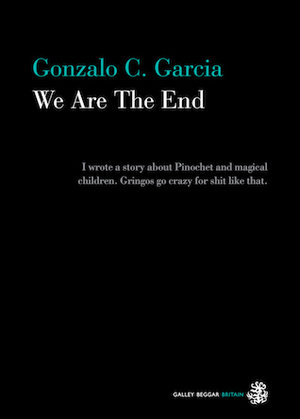You have no items in your cart. Want to get some nice things?
Go shoppingWe Are the End, Gonzalo C. Garcia’s debut novel, arrives with a measure of expectation, published as it is by Galley Beggar, a small press whose keen eye for overlooked, unorthodox writers and use of handsome uniform covers (a strategy currently in vogue, with Pushkin Press, Pereine Press and Fitzcarraldo Editions all doing something similar) have helped them carve out a solid indie standing, aided by Eimear McBride’s award-strewn 2013 novel A Girl is a Half-Formed Thing.
We Are the End follows Tomás, a computer game designer in Santiago experiencing what amounts to writer’s block. ‘He’s been trying to come up with a story for months now and he lied to Jaime [his colleague] about his progress. He told him “it was coming”, IT, because after all, that’s what it takes. One idea, one moment, and it will come, it must.’
But this block is merely a symptom of a grander malaise. Tomás is in the drear throes of toska. The story opens on him cutting a faintly Beckettian figure, alone in his chaotic flat at 4:17am, using a straw to drink coffee directly from a cafetière because he owns no cups and sees nothing to be gained from buying some. We learn that he loathes his job, that a band he quit are on the verge of breaking through, that his apartment is literally falling apart around him and other sundry indicators of his mental state: ‘Getting up, taking a shower, dressing up, drying and waxing his hair, cleaning his glasses and shaving… He finds it hard to want to do any of it.’ The text is punctuated with the cryptic scribblings in Tomás’s ‘IDEAS book’, plans for outlandish, nonsensical games which no sane person would ever want to play. Worst of all – indeed the fount of Tomás’s woe – is Eva, his ex-girlfriend who has left him for Antarctica, preferring its icy and unpeopled badlands to his dowdy company.
Indie bands, internationalism, computer games, coffee, unrequited love. If We Are the End is beginning to sound like it’s got MILLENNIAL plastered all over it, that’s because it has. But this isn’t so much the bittersweet coming-of-age tale the above precis might imply. What Garcia offers is instead an unwaveringly bleak satire on Generation Y, capturing the slow souring of that age as its unstoppable idealism comes up against the unbudgeable drudgery that is adulthood.
The novel has much in its favour, not least a canniness in regards to the expectations such stories set up. On the surface, We Are the End is cut from the same cloth as blokey romcoms like Wayne’s World, Shaun of the Dead and much of Woody Allen’s output, where a humdrum loser wins back his wayward soulmate through sheer bull-headed perseverance. Here, Tomás decides to travel to the Antarctic and reclaim Eva as his. The players are all present – the slacker best friend, the wise old man, the gaggle of friendly misfits who pool their eccentricities to help the protagonist to get his way, the belligerent ex – but all is upended: his best friend turns out to be more successful than him, both professionally and romantically, the misfits are simply alienated by Tomás, the wise old man is just ‘fucking with you’, and Eva, the ex, is content to remain just that. Nonetheless Tomás’s trust in the cast-iron power of narrative, specifically ‘the use of the “Damsel in Distress” tropes’, remains steadfast.
A positive too is how refreshing it is to see a relatable depiction of the world of tech development. Most of our knowledge of the industry comes from its totemic, faintly alien figures – Steve Jobs, Mark Zuckerberg, et al. – and the cosmic influence and vast sums at their beck. Here things are more recognisably squalid, with Tomás having no idea what he’s doing and for whom coding is as elusive as it is to the lay reader. His success, such as it is, rests on a single, mangled game: ‘It was about an elephant called Bimbo, and he defied the laws of gravity, because when he jumped to collect coins he never dropped back down, and all you were left with was an empty screen with moving platforms. Disney bought it in the end, and rehashed it as a cheap mobile game about Dumbo, the flying elephant, and they were both allowed to keep their jobs.’
As this suggests, Garcia is a funny writer. At one point, he discovers co-worker Jaime had ‘been listening to Phil Collins who Tomás thinks is the opposite of anything respectable because he wears gloves to drum and can’t even sing… and he’s overweight, has no hair and his name is Phil Collins.’ Tomás’s interior excursions such as this proliferate, but his funniness grows problematic, nigglingly so at first but in a way which becomes harder to ignore as the book continues.
The issue itself is exemplified about a third of the way through the novel when Tomás’s father unexpectedly dies. This brings him into contact with his family, including his onetime normal sister who has converted to fundamentalist hippiedom and arrives at the funeral with an entourage of crusty bums and topknot jugglers. This allows for some acid observations and a few pages of ersatz profundity, but the reason why it’s possible for me to reveal the demise of the protagonist’s father without it being a spoiler is that it has no aftereffects. Other than a jokey funeral set-piece, Tomás’s father’s passing is literally of no consequence: grief remains absent, the plot is unaffected, Tomás returns to his apartment.
More significantly, Garcia’s distinguishing humour – half contemptuous, half oddball – all of which is channelled through Tomás’s POV, is effective in nudging the reader into siding with the protagonist. But this begins to impart a kind of queasiness when viewed alongside his actions, many of which, while not being unconscionable, are at least fairly objectionable – Tomás abandons his students mid-lecture to go for a lie down, he lies to his colleagues about working on a non-existent game, he’s routinely dismissive to all female characters he encounters – and which don’t appear to provoke him into learning anything in the way of a lesson. To the final page Tomás remain unchanged and unpleasant, which at times makes finding the 300-plus which precede it lolsome a fairly big ask for a reader.
But is this a big deal? Ultimately what makes We Are the End successful yet not quite able to meet its potential is an issue not with its comedy but sadly with the wider social landscape. This is most telling when Tomás is beset by crowds of protestors, something which occurs periodically throughout the book. Their ire is omnivorous – education, global warming, capitalism – and to our hero they’re simply a nuisance, rendered in fairly broad, stereotyping terms: ‘They’re all wearing hiking boots, green jungle hats with nets on the back of the neck, and oversized military jackets filled with pins and badges and creases and holes… students dressed up as zombies carrying anti-government and free education banners. This one fat zombie sharing a metal pole with him isn’t wearing a shirt and has painted his belly white and patched with scars and patched with black scars. He doesn’t need the paint to scare anyone with that belly.’
All humorous enough, but the impression left is of a joke which might have fared better in more cosseted, bygone days, when protest was altogether less necessary than it now feels.
Likewise, a tale which is essentially an extended delineation of an affluent man’s neuroses, leaving in its wake a trail of spent women, seems perhaps a tad less amusing a prospect today than when it was first conceived.
We Are the End is published by Galley Beggar Press.

About Richard Hirst
Richard V. Hirst is from Manchester. His writing has been featured in the Guardian, the Big Issue and Time Out, among others. His latest book is The Night Visitors, co-written with Jenn Ashworth.





